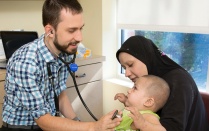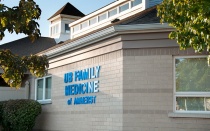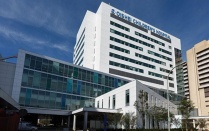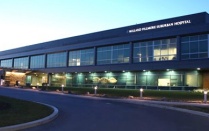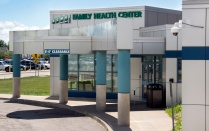Family Medicine Inpatient Service
The outpatients you see in your family medicine clinic will experience continuity of care as you manage their conditions in an inpatient setting.
Each of our affiliated hospitals has a family medicine inpatient service that provides acute care to patients we see in our office practice. During this rotation, you’ll work with family medicine faculty and residents to care for these patients.
This includes:
- conducting initial and repeat evaluations
- admitting patients
- deciding on a care plan
- performing basic procedures
- consulting with other specialists
- planning for your patients’ discharge and continued care
You’ll come to the hospital for newly admitted patients, deliveries or unexpected changes in your patients’ condition, and you’ll tend to patients in special care units.
You’ll develop teamwork skills while rotating on this service, working with other residents to preround, write progress notes, discuss patient care issues and develop care plans.
As you progress through residency, you’ll advance from delivering care while under direct faculty supervision to delivering care independently. Your caseload will increase, and you’ll be charged with more critically ill or challenging patients. By your third year, you’ll assume a supervisory role and maintain responsibility for all patients on service.
Throughout your rotation, we schedule frequent teaching conferences with faculty from family medicine and medical subspecialties.
Procedures Learned
On this service, you’ll:
- interpret ECGs and radiologic/diagnostic imaging
- perform venous puncture and place IV catheters
- perform arterial punctures and arterial blood gas
- place central venous lines
- insert urinary catheters and nasogastric tubes
- perform paracentesis and thoracentesis
- perform cardiopulmonary recussitation and ACLS protocols on unstable patients
Conditions Seen
You’ll learn how to manage common hospital conditions, including:
- acute coronary syndrome
- acute renal failure
- acute respiratory failure
- atrial fibrillation
- congestive heart failure
- COPD exacerbation
- delirium/dementia
- diabetes complications
- electrolyte abnormalities
- GI bleed
- hip fractures
- HIV/AIDS
- pancreatitis
- pneumonia
- pulmonary embolism
- sepsis
- stroke
Clinical Sites
Depending on your residency track, you’ll see patients at one of these hospitals:
Years Taken
PGY-1, 2 and 3
Length of Rotation
12 weeks each year


